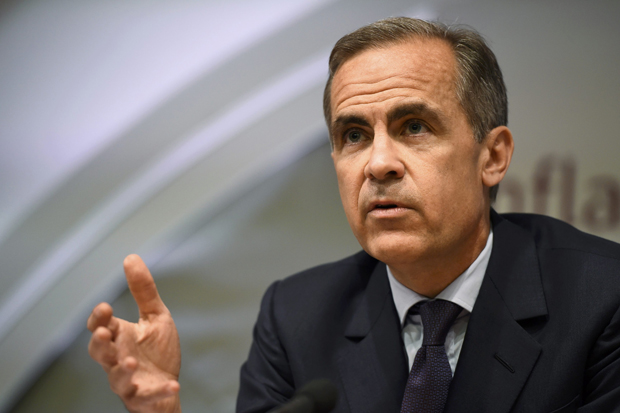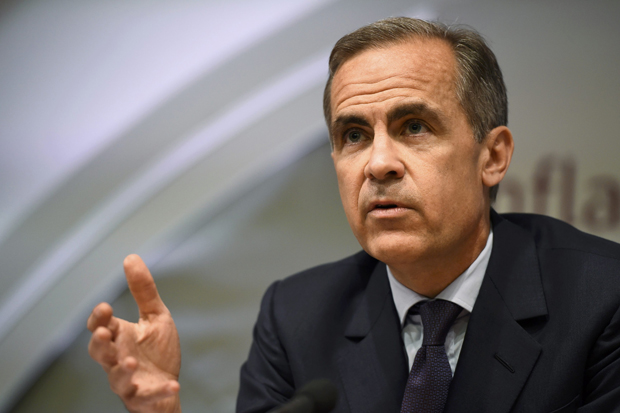Oh dear. Mark Carney is irritated. His proud independence has been challenged. The Prime Minister had the temerity to admit that she was not altogether thrilled with his ‘super-low’ interest rates and quantitative easing. These policies meant that people with assets got richer, she pointed out. ‘People without them suffered… People with savings have found themselves poorer.’ Mr Carney found this intolerable and haughtily rebuffed her, saying, ‘The policies are done by technocrats. We are not going to take instruction on our policies from the political side.’ Back in your box, Mrs May. Carney’s in charge!
As they clash, it is increasingly hard to remember what a bright day it was in November 2012 when George Osborne signed up Mr Carney to be the new governor of the Bank of England. Mr Carney was the very best — ‘the outstanding central banker of his generation’. Not for Britain some dusty old Bank of England jobsworth but a stylish, handsome, international banking pin-up. It was worth paying extra to persuade him to come over from Canada, said Mr Osborne.
Now he has been here for just over three years and it is fair to say that a problem has emerged that is even worse than his tiff with the Prime Minister. He keeps getting it wrong. Soon after his arrival in the summer of 2013, he implied he would think about raising interest rates when unemployment fell below 7 per cent. But he evidently did not understand what was happening in the labour market here as influenced by the reforms of Iain Duncan Smith. Unemployment fell quickly below this level. Did he raise interest rates? No. It would have been wrong. He had misfired. All he had achieved was to demonstrate that he didn’t understand a key part of the British economy.
Mr Carney then changed tack. He tried suggesting that he would be looking at a variety of indicators and particularly mentioned a rise in real wages. We might expect a rise in interest rates then. Real wages were flat as a pancake at the time, in February 2014. But almost as soon as he presented the new measure, real wages jumped into life and their growth reached 3 per cent later that very year. Lo and behold, interest rates remained unmoved yet again.
In July 2015, he suggested that ‘at the turn of this year’ the time would probably come, at last, when interest rates would be raised. The turn of the year duly came and went. Yet again, Mr Carney was wrong.
Then came the EU referendum. Mr Carney warned the nation in May that a vote for Brexit could lead to a recession — two consecutive quarters of negative growth. He appeared to be going beyond any formal Bank of England forecast. Effectively he was supporting the Remain campaign by backing Project Fear. He gave up the political neutrality expected of governors. This forecast has joined the weary list of ones that have been proved incorrect.
Mr Carney is almost an inverted Cassandra. Cassandra was never believed but always right. Mr Carney is still taken seriously by some but is reliably wrong.
In August, he did at last change interest rates. After all his warnings about raising them, he did the opposite. He lowered the bank rate from half a per cent to a mere quarter. He also announced an extra £60 billion of quantitative easing. At the press conference, he suggested that due to Brexit, unemployment could rise by a quarter of a million. It looks like he was wrong yet again. So far, there has been no rise in unemployment whatsoever. Of course it might still happen. But up until now, it looks like yet another forecast blunder with the added side effect that he has helped weaken the pound.
Recently, Mr Carney has suggested that the economy has not done as badly after the Brexit vote as he had forecast because of his timely intervention in August. This is as vain as it is ludicrous. A quarter-point cut in interest rates could not have such a remarkable effect in such a short time.
His August cut in interest rates was particularly misguided because he did it when the money supply was rising fast. According to Professor Tim Congdon, the broad M4x measure of money supply rose at an annualised rate of 11 per cent in the three months to August. The money supply is something that most central bankers pay great attention to. But not Mr Carney, it seems.
Then the other week we had sterling’s ‘flash crash’. The BBC, in particular, has sought to blame sterling weakness on ‘increased fears of a hard Brexit’. But no one knows for sure which factors have been most influential. Weak sterling makes sense at a time when Britain has a fast-growing money supply and a governor who has lowered interest rates and says he stands ready to make monetary policy even more lax.
Mr Carney has lowered interest rates at precisely the wrong time. He has also shown an inability to learn from his mistakes. After the first blunders regarding unemployment, he should have apologised and revised his model of the British economy. His ‘forward guidance’ has been wrong and now he is damaging confidence with his gloomy forecasts and his undermining of sterling.
Mr Carney rode in on the wave of belief in central bankers. They did better than politicians had done in the 1970s and 1980s with regard to inflation. Their quantitative easing helped avert a deeper economic crisis after the crash of 2008. But these successes have led to an exaggerated idea of what central banks can do. Mr Carney is the embodiment of this excess faith. He is ‘peak central banker’. He has talked about equality and ‘inclusive capitalism’ and productivity as though he has some role in promoting them. But the proper job of the central bank is only monetary policy. His job is financial stability and low inflation. It is vain of him if he thinks that by changing interest rates or manipulating the money supply he is going to affect structural aspects of the economy over which he has no control.
When he arrived, Mr Carney let it be known that he did not want to serve for a full eight years and would leave after five. But last December he said he wanted to stay the full term. He should not be allowed to. He has got too much wrong. He has been too political. He did not like the referendum result and now is trying to continue the argument by talking down the economy.
As Mr Bennet, in Pride and Prejudice, says to his daughter Mary, who is playing the piano badly: ‘You have delighted us long enough. Let the other young ladies have time to exhibit.’ It is time for Mr Carney to shut the piano and go home.
Got something to add? Join the discussion and comment below.
Get 10 issues for just $10
Subscribe to The Spectator Australia today for the next 10 magazine issues, plus full online access, for just $10.
You might disagree with half of it, but you’ll enjoy reading all of it. Try your first month for free, then just $2 a week for the remainder of your first year.














Comments
Don't miss out
Join the conversation with other Spectator Australia readers. Subscribe to leave a comment.
SUBSCRIBEAlready a subscriber? Log in